Katy Sprague: The family piecing together an 'avoidable murder'
- Published
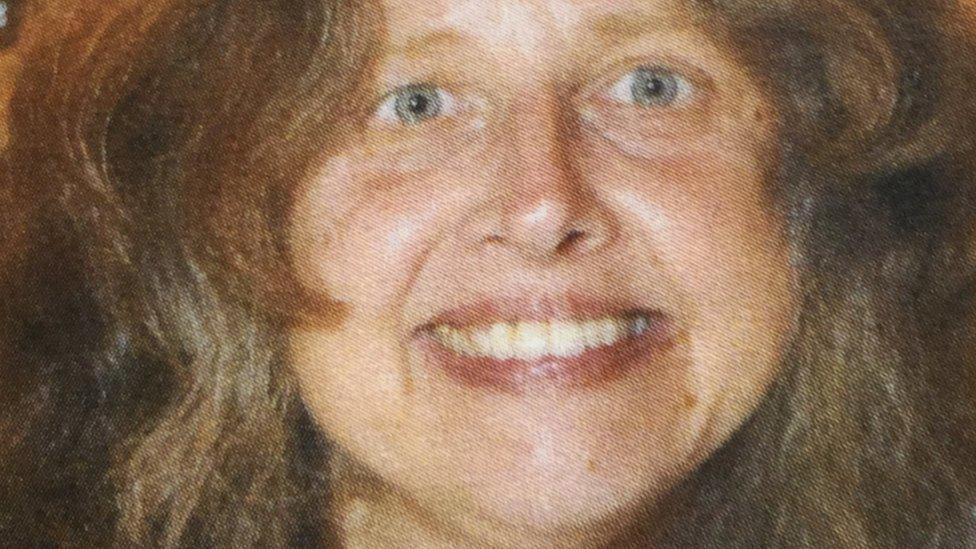
Katy Sprague was described by her family as "kind, considerate, loving and loyal"
Katy Sprague was strangled to death in the common room at a block of flats for people with mental health issues. Her family had long-held concerns for her safety. New details of her killer's violent past have amplified their search for answers over a death they feel could have been avoided.
In the months before she was murdered, Katy Sprague had become worried the man living in the flat below was becoming more and more unwell.
He would often disturb her late at night, "banging around and being sick"; on occasions he was found lying in the foetal position in a communal corridor.
Her family raised their concerns to staff but say they were played down - each of the residents of Denham Place lived there because they needed help with their mental health.
But, all around, the support for her sister was becoming more threadbare, says Rebecca Sprague.
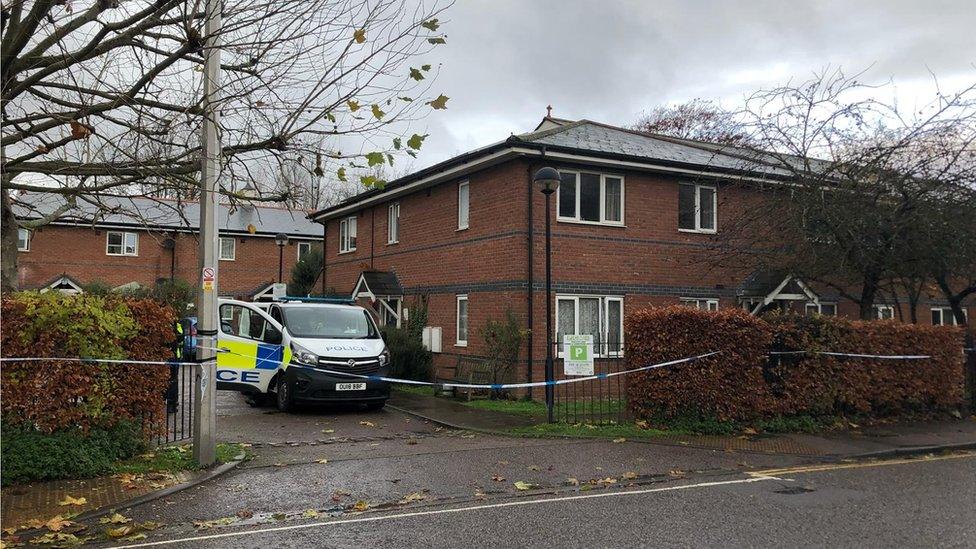
A large police cordon was put in place following the murder in November 2019
Katy, 51, had been living at the block in Cambridge for 13 years, having struggled with acute anxiety for more than two decades.
In Denham Place, morale among staff appeared low. Elsewhere, social clubs were closing and activities halted - part of a "gradual, steady decline" in services which had left "nothing for people with mental health issues to go to".
That fraying safety net around Katy has become a key focus for the family as they piece together the factors that led to Katy's death at the hands of Zac Jackson, the man who lived downstairs.
Her murder has already sparked two separate independent reviews into the organisations whose job it was to care for Katy.
In their victim impact statement to the court, her family said they believed her death was "preventable" and "avoidable".
But a string of details that emerged at Jackson's murder trial has left them asking how an unstable man with a history of violence towards women - who requested to be sectioned hours before he killed her - was left alone with her, with no staff around.
"[People with mental health problems] cannot be left to basically fend for themselves in the wider community without adequate support," Rebecca says.
"Obviously, mental health services have been cut to the bare bones, and some of the results are people are dying because of this."
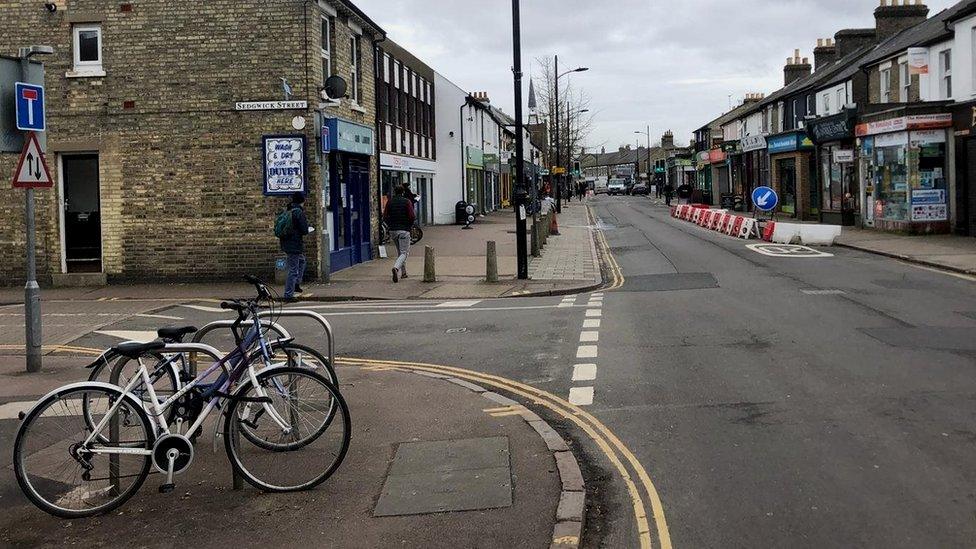
Independent shops line much of Mill Road in Cambridge, near the scene of the murder in 2019
Katy had a young mental age and had suffered from anxiety since around the time of her father John's sudden death.
She was a caring and thoughtful person, says Rebecca, describing her as someone who "enjoyed life, but became very, very anxious over seemingly quite simple situations".
Katy lived in the flat above Jackson and, though the two were not friends, they would occasionally bump into one another in Cambridge's bookshops.
The 38-year-old's flat was piled high with Star Trek magazines and books on conspiracy theories, from the Moon landings to the Kennedy assassination.
He had been diagnosed with an anti-social and emotionally unstable personality disorder, and had spent several periods at Fulbourn Hospital, a nearby mental health facility in Cambridgeshire.
It was a place he knew well, and where he wanted to return to on the day he murdered Katy.
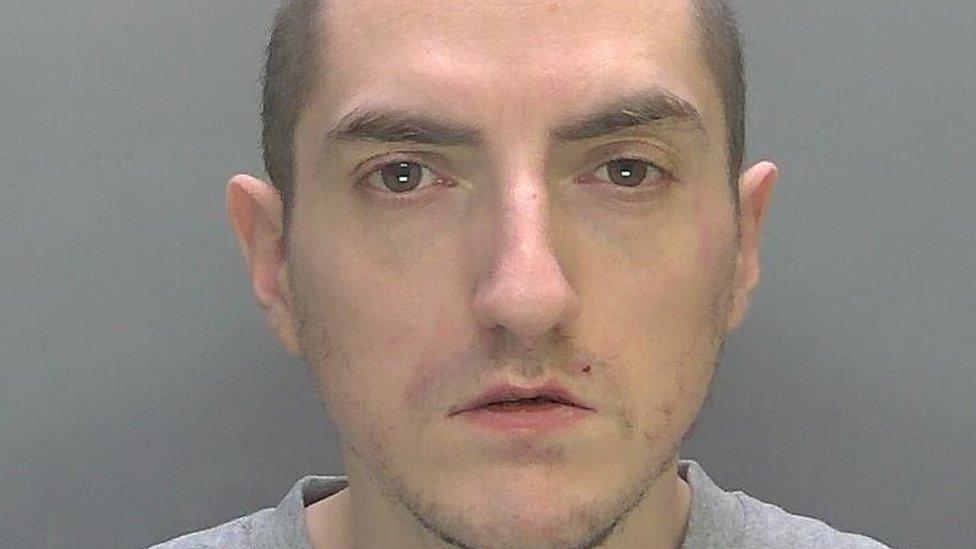
Zac Jackson had a history of violence, Katy's family would learn
On the morning of 27 November 2019, he was visited by a community psychiatric nurse for his fortnightly anti-psychotic injection.
In his flat, Jackson told her he wanted to be sectioned under the Mental Health Act at Fulbourn - then attempted to strangle her.
She pushed him away and went to tell a manager but, following her, Jackson told her he was "going to kill her, kill the manager and kill Katy".
The nurse called the mental health crisis team to attend to Jackson but was told was no-one was available to assess him until the next day.
The news seemed to placate Jackson.
Later that day, with no staff on site at Denham Place, Jackson strangled Katy to death in the common room.
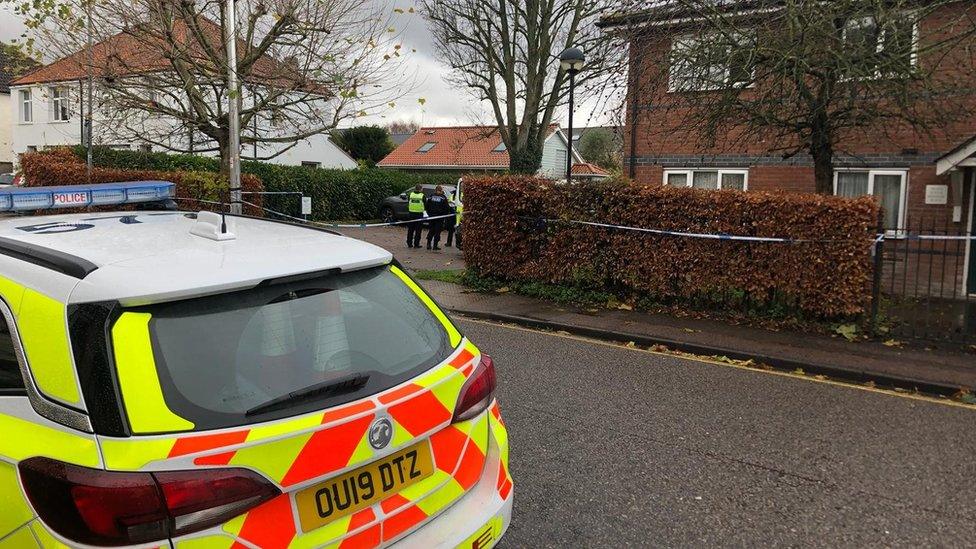
Jackson must serve a minimum of 15 years in prison for Katy's murder
At his trial in February, it emerged that Jackson had a history of strangulation attempts, though no previous convictions.
Katy's family learned he had tried to strangle a support worker in 2018. Two further incidents happened at Fulbourn Hospital; one in 2016 and another in 2002, when he attempted to strangle his mother.
'Warning signs'
The court was told that, as a child, Jackson had witnessed violence between his parents, both Class A drug addicts who later died from overdoses.
As an adult, he would provoke altercations with random women in the street, the court was told, making disparaging remarks before confronting them if they challenged him.
"The warning signs were there," says Rebecca.
"He shouldn't have been left in minimal supported housing and very unsupported.
"He obviously didn't want to be in Denham Place. He didn't, as far as we know, have any family support.
"More regard should have been taken to the fact he did have this history of violence and, we later learned, it seems to be violence particularly towards women."
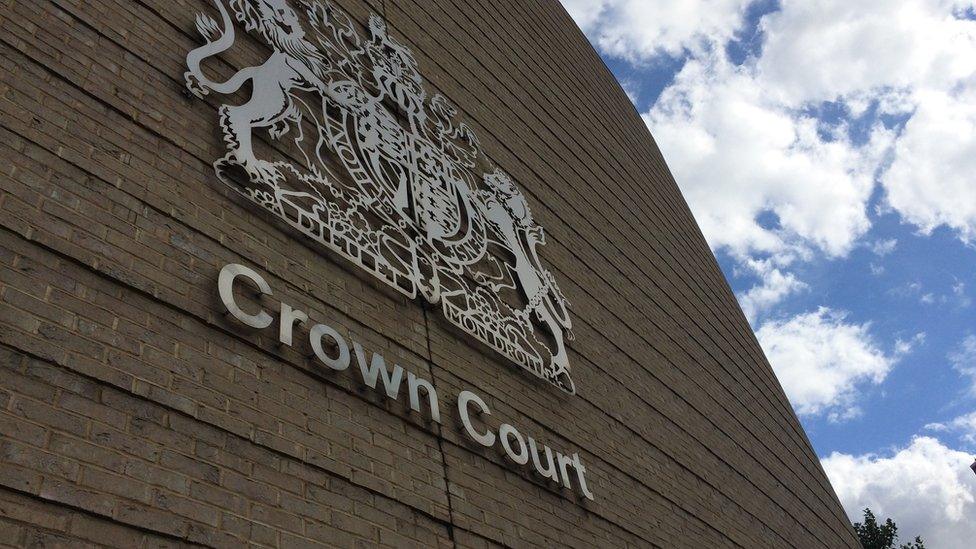
Zac Jackson's trial at Cambridge Crown Court raised more questions for Katy Sprague's family
Jailing Jackson for life, the judge Mr Justice Bryan described him as "something of a loner, and reclusive".
He said his outburst about killing Katy was "rightly [seen as a] cry for help" as he wanted to be sectioned - a tactic he had used before.
'Threat to kill'
But Katy's family say questions remain over the response of the crisis team, which did not respond when called, and how Denham Place staff responded after Jackson's outburst in the manager's office.
"Katy certainly was not aware there was any threat to kill her otherwise she wouldn't have been in the common room on her own with him," says Rebecca.
The common room of the 16-flat complex had long been a source of concern to Katy's family, and they raised fears over it being open when support staff were not on site - just as on the day of the murder.
They also say Katy had previously been physically assaulted there by another resident - not her killer.
Her family believe if their concerns had been fully addressed, Katy would be alive today.
A local safeguarding adults review is now under way into the case, as well as an NHS review.
When contacted by the BBC, each agency said they were waiting for the outcome of that review.
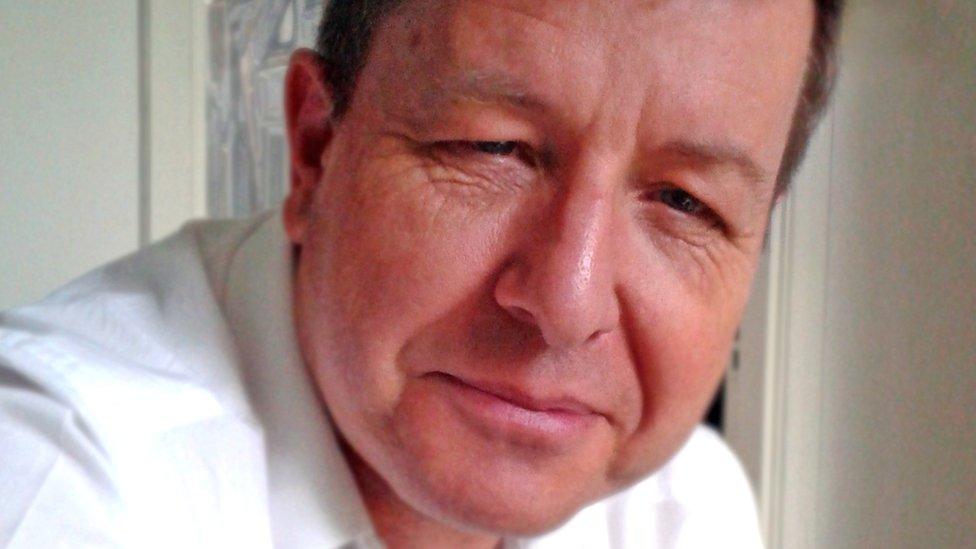
Julian Hendy, from the charity Hundred Families, said there were "serious questions to be asked" about the case
Julian Hendy runs the charity Hundred Families, which supports those affected by mental health homicides.
He says Jackson was "clearly a very troubled man with concerning history of threatening innocent women".
"There are serious questions to be asked if he was receiving the appropriate level of supervision at Denham Place, and whether services responded quickly enough when he asked to be sectioned," he says.
"If they had been able to respond sooner, Katy might still be with us today."
Cambridgeshire County Council says the review being done on behalf of the Cambridgeshire and Peterborough Safeguarding Adults Partnership Board will be made public "at the appropriate time".
"The local authority and partners will ensure that there is an open and transparent process to make sure that any lessons learnt are shared," a spokeswoman for the authority says.
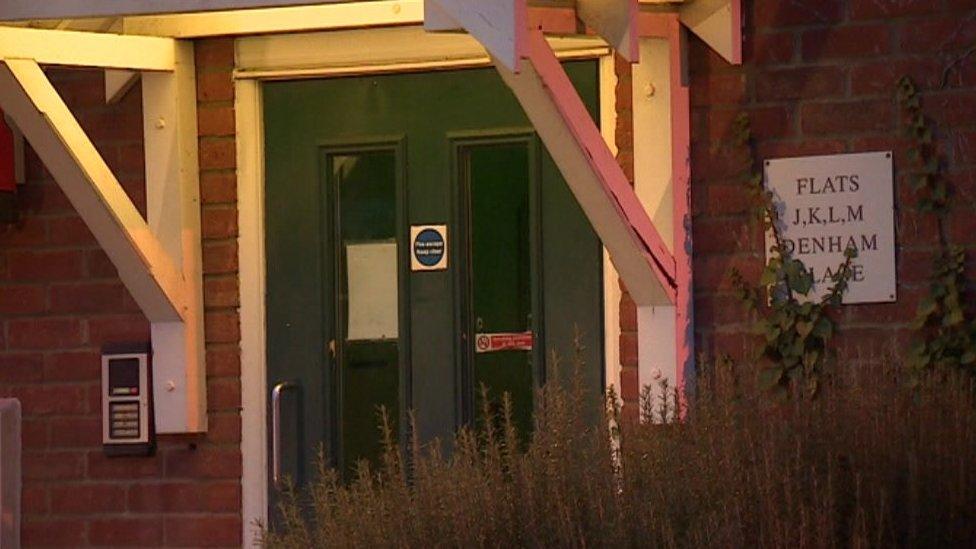
Denham Place is made up of 16 supported living flats for people with mental health issues
The council has commissioned Sanctuary Supported Living to operate Denham Place's day-to-day support since 2017.
A spokesman for Sanctuary Supported Living says: "Our thoughts remain with Katy's family during this very difficult time.
"We are co-operating fully with the [review] being conducted on behalf of the local authority and await the outcome."
A spokesman for Cambridgeshire and Peterborough NHS Foundation Trust, which runs the crisis team, says: "We would like to offer our sincere condolences to Katy's family and friends.
"We are supporting the review... to make sure that any lessons from this incident are acted on."

Find BBC News: East of England on Facebook, external, Instagram, external and Twitter, external. If you have a story suggestion email eastofenglandnews@bbc.co.uk
- Published10 February 2021

- Published5 February 2021

- Published26 January 2021
